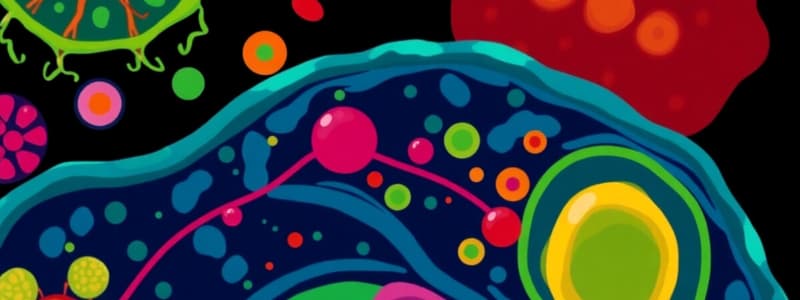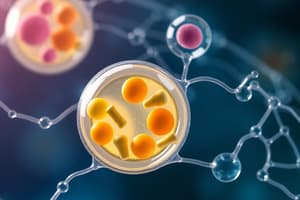Podcast
Questions and Answers
Which cellular component is primarily responsible for modifying and packaging proteins for secretion from the cell?
Which cellular component is primarily responsible for modifying and packaging proteins for secretion from the cell?
- Endoplasmic Reticulum (ER)
- Golgi Apparatus (correct)
- Mitochondria
- Ribosome
If a cell is placed in a hypertonic solution, which of the following processes will predominantly occur?
If a cell is placed in a hypertonic solution, which of the following processes will predominantly occur?
- Water will move into the cell, causing it to swell.
- There will be no net movement of water as the solution is isotonic.
- Water will move out of the cell, causing it to shrink. (correct)
- Solutes will move into the cell, attempting to equalize concentration.
During which phase of mitosis do sister chromatids separate and migrate toward opposite poles of the cell?
During which phase of mitosis do sister chromatids separate and migrate toward opposite poles of the cell?
- Prophase
- Anaphase (correct)
- Telophase
- Metaphase
How does RNA differ structurally from DNA?
How does RNA differ structurally from DNA?
What is the primary role of ribosomes within a cell?
What is the primary role of ribosomes within a cell?
Which type of tissue is characterized by its ability to contract, enabling movement?
Which type of tissue is characterized by its ability to contract, enabling movement?
In active transport, what enables substances to move across the cell membrane against their concentration gradient?
In active transport, what enables substances to move across the cell membrane against their concentration gradient?
Which of the following correctly lists the stages of mitosis in the appropriate order?
Which of the following correctly lists the stages of mitosis in the appropriate order?
What is the main function of the plasma membrane?
What is the main function of the plasma membrane?
Which connective tissue type is primarily responsible for energy storage and insulation?
Which connective tissue type is primarily responsible for energy storage and insulation?
Which process involves the synthesis of mRNA from a DNA template?
Which process involves the synthesis of mRNA from a DNA template?
Which of the following best describes the arrangement of cells in epithelial tissue?
Which of the following best describes the arrangement of cells in epithelial tissue?
Which cellular organelle is the primary site of ATP production through cellular respiration?
Which cellular organelle is the primary site of ATP production through cellular respiration?
What is the primary role of the endoplasmic reticulum (ER) in a cell?
What is the primary role of the endoplasmic reticulum (ER) in a cell?
Which description accurately defines the function of dendrites in a neuron?
Which description accurately defines the function of dendrites in a neuron?
During which phase of mitosis do the nuclear envelope and nucleoli reappear?
During which phase of mitosis do the nuclear envelope and nucleoli reappear?
Which type of connective tissue primarily provides support in the ear and nose?
Which type of connective tissue primarily provides support in the ear and nose?
What is the 'control center' of the cell that contains genetic material?
What is the 'control center' of the cell that contains genetic material?
Which type of muscle tissue is responsible for voluntary movements?
Which type of muscle tissue is responsible for voluntary movements?
What structure of DNA allows it to effectively store and transmit genetic information?
What structure of DNA allows it to effectively store and transmit genetic information?
Flashcards
What is the plasma membrane?
What is the plasma membrane?
Encloses cytoplasm and forms the outer boundary of the cell.
What is cytoplasm?
What is cytoplasm?
Gel-like substance within a cell containing specialized organelles.
What is the nucleus?
What is the nucleus?
The 'control center' of the cell, containing genetic material.
What is the Golgi apparatus?
What is the Golgi apparatus?
Signup and view all the flashcards
What do mitochondria do?
What do mitochondria do?
Signup and view all the flashcards
Endoplasmic reticulum (ER)
Endoplasmic reticulum (ER)
Signup and view all the flashcards
What is diffusion?
What is diffusion?
Signup and view all the flashcards
What is osmosis?
What is osmosis?
Signup and view all the flashcards
What is active transport?
What is active transport?
Signup and view all the flashcards
What is DNA?
What is DNA?
Signup and view all the flashcards
What is the structure of DNA?
What is the structure of DNA?
Signup and view all the flashcards
What is RNA?
What is RNA?
Signup and view all the flashcards
What is transcription?
What is transcription?
Signup and view all the flashcards
What is translation?
What is translation?
Signup and view all the flashcards
What is mitosis?
What is mitosis?
Signup and view all the flashcards
What happens in prophase?
What happens in prophase?
Signup and view all the flashcards
What happens in metaphase?
What happens in metaphase?
Signup and view all the flashcards
What happens in anaphase?
What happens in anaphase?
Signup and view all the flashcards
What happens in telophase?
What happens in telophase?
Signup and view all the flashcards
What are the structural components of a neuron?
What are the structural components of a neuron?
Signup and view all the flashcards
Study Notes
- Cells have three main parts: the plasma membrane, cytoplasm, and nucleus.
Plasma Membrane
- Encloses the cytoplasm
- Forms the outer boundary of the cell
Cytoplasm
- Gel-like substance inside a cell
- Contains specialized organelles
Nucleus
- Known as the control center
- Contains genetic material
Ribosomes
- Known as protein factories
Golgi Apparatus
- Packages
- Processes
- Transports substances to the plasma membrane for release
Mitochondria
- The site of cellular respiration
- Where energy is released
Endoplasmic Reticulum (ER)
- Network of connecting sacs and canals
- Carries substances through the cytoplasm
Diffusion
- Substances scatter evenly throughout an available space
Osmosis
- Diffusion of water
- Occurs when some solutes cannot cross the membrane
Active Transport
- Moves substances through a cell membrane
- Movement occurs against the concentration gradient
DNA
- Contains genetic information
- Determines expression of heritable traits
DNA Structure
- Long, narrow spiral staircase (double helix)
- Has sugar-phosphate sides and base-pair steps
RNA
- Single-stranded molecule
- Transfers genetic information from the nucleus to the cytoplasm
Two Processes Involving RNA
- Transcription
- Translation
Transcription
- DNA unwinds and separates to form mRNA
- mRNA carries the genetic message
Translation
- Ribosomes read mRNA
- Assembles amino acids into protein strands
Mitosis
- Cell division process
- Distributes identical chromosomes to each new daughter cell
Four Stages of Mitosis
- Prophase
- Metaphase
- Anaphase
- Telophase
Prophase
- Chromatin organizes into chromosomes
- Centrioles move
- Spindle fibers form
Metaphase
- Chromatids align across the center
- Spindle fibers attach
Anaphase
- Chromatids separate
- Chromosomes move to opposite ends
- A cleavage furrow appears
Telophase
- Division completes
- Nuclei and envelopes appear
- Cytoplasm and organelles divide equally
Epithelial Tissue
- Classified by shape and arrangement of cells
Types of Connective Tissue
- Areolar
- Adipose
- Fibrous
- Bone
- Cartilage
- Blood
- Hematopoietic
Three Types of Muscle Tissue
- Skeletal
- Cardiac
- Smooth
Three Structural Components of a Neuron
- Cell body
- Axon
- Dendrites
Studying That Suits You
Use AI to generate personalized quizzes and flashcards to suit your learning preferences.




